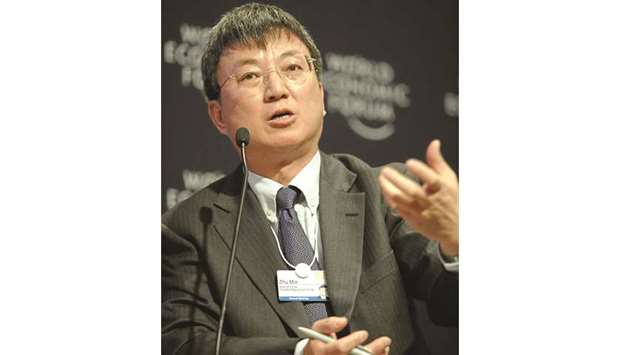China has little room for raising benchmark interest rates as inflation remains subdued and authorities try to reduce the economy’s debt burden, a former vice-governor of the country’s central bank, Zhu Min, said yesterday.
“The deleveraging will continue but I don’t see the reason to raise interest rates,” Zhu, who is also a former deputy managing director of the International Monetary Fund, told Reuters Global Markets Forum on the sidelines of the World Economic Forum in
Davos.
On inflation, he said the outlook was benign, though authorities would need to watch for signs that a pick-up in factory-gate inflation is feeding through to consumer prices.
“That is the key issue,” Zhu said.
The world’s second-largest economy expanded 6.9% in 2017, accelerating for the first time in seven years due partly to an export recovery, defying concerns that intensifying curbs on industry and credit would hurt
expansion.
China’s consumer prices rose 1.6% last year, well within Beijing’s annual target of 3%, while producer prices surged 6.3%, ending a five-year falling streak.
“I think there’s clearly a show of resilience of the Chinese economy and the first success of economic transformation, moving from more manufacturing and exports to the service sector,” said Zhu, now head of Tsinghua University’s national institute of financial research.
China’s financial deleveraging has pushed up money market rates, bond yields and corporate funding costs as broad M2 money supply growth hit a record low of 8.2% last year – well below the official target of around 12%.
The weighted average lending rate for non-financial firms, a key indicator of corporate funding costs in China, rose by 49 basis points in the first nine months of 2017 to 5.76%, according to central bank data.
Zhu pointed to a 12% annual rise in total social financing – a broad measure of credit and liquidity in the economy – as evidence that the real economy was receiving adequate credit support.
He said China would continue to reform its financial sector and gradually open its capital account in coming years.
Beijing will assess the possible impacts from US President Donald Trump’s trade policy before deciding how to respond, Zhu said.
“Trump’s trade policy against China is very unreasonable.
China will continue to support the globalisation and the free trade flow,” he said, adding that a trade war with the United States would be “no good for anyone”.
Trump said last week the United States was considering imposing a big “fine” as part of a probe into China’s alleged theft of intellectual property, the clearest indication that his administration would take retaliatory trade action.

Zhu: China would continue to reform its financial sector and gradually open its capital account in coming years.
